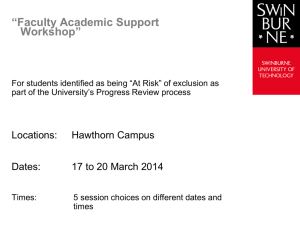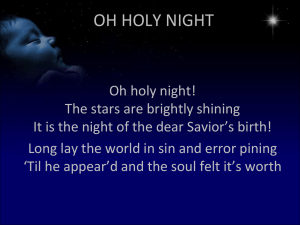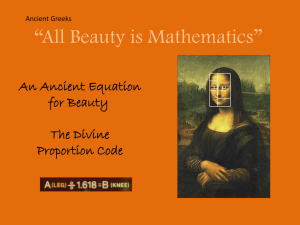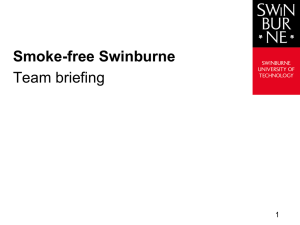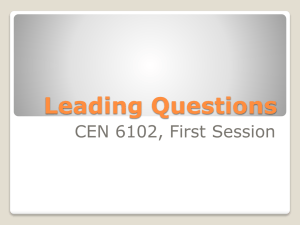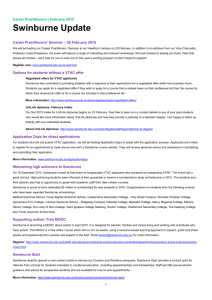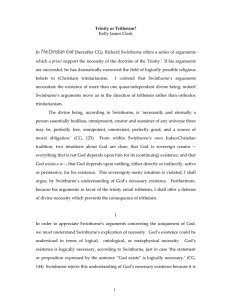REXP And REV6
advertisement
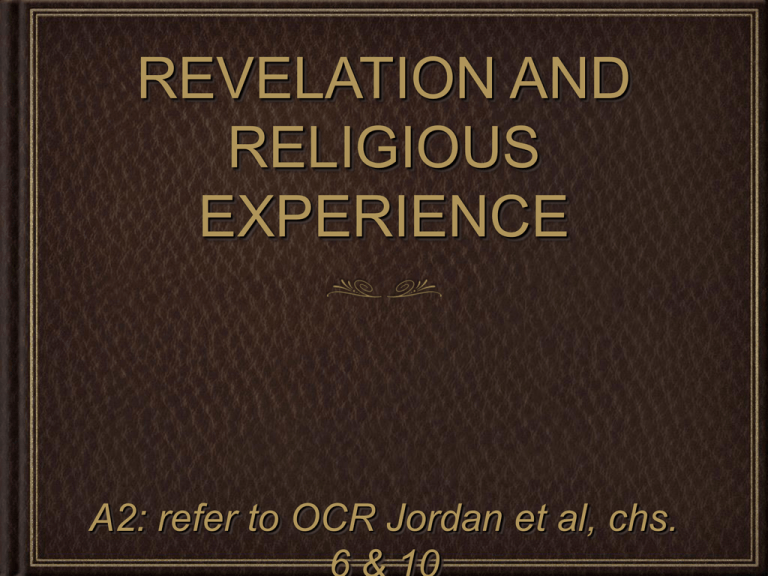
REVELATION AND RELIGIOUS EXPERIENCE A2: refer to OCR Jordan et al, chs. REVELATION AND RELIGIOUS EXPERIENCE CHAPTER 6 Arguments for the existence of God from Religious Experience WHAT IS RELIGIOUS EXPERIENCE ? non-empirical occurrence - may be ‘supernatural’ ‘mental event’ which the individual is aware of either ‘spontaneous’ or result of ‘training’ result of REX is being ‘drawn into a deeper knowledge or awareness of God’ experience is not the divine itself but mediates the divine each experience is unique and cannot be shared ‘genuine’ REXs improve the individuals concerned WHAT IS RELIGIOUS EXPERIENCE ? according to encylopaedia britannica ...1 •Specific experiences such as wonder at the infinity of the cosmos, the sense of awe and mystery in the presence of the holy, feelings of dependence on a divine power or an unseen order, the sense of guilt and anxiety accompanying belief in a divine judgment, and the feeling of peace that follows faith in divine forgiveness. Some thinkers also point to a religious aspect to the purpose of life and with the destiny of the individual. WHAT IS RELIGIOUS EXPERIENCE ? according to encylopaedia britannica ...2 •In the first sense, religious experience means an encounter with the divine in a way analogous to encounters with other persons and things in the world. In the second case, reference is made not to an encounter with a divine being but rather to the apprehension of a quality of holiness or rightness in reality or to the fact that all experience can be viewed in relation to the ground from which it springs. In short, religious experience means both special experience of the divine or ultimate and the viewing of any experience as pointing to the divine or ultimate. DIFFERENT TYPES OF RELIGIOUS EXPERIENCE •THIS IS AN ATTEMPT IN THE OCR TEXTBOOK TO CLASSIFY RELIGIOUS EXPERIENCES BASED ON THE RESULTS OF THE EXPERIENCES Most are ‘mystical’ - a sense of union with the divine Many are ‘prayer’ experiences - resulting from meditation and reflection ‘Conversion’ experiences are life changing and permanent RELIGIOUS EXPERIENCE AS AN ARGUMENT FOR THE EXISTENCE OF GOD •“There is not one grace of the Spirit of God, of the existence of which...Christian practice is the most decisive evidence. The degree in which our experience is productive in practice shows the degree in which our evidence is spiritual and divine.” - Jonathan Edwards (Treatise on Religious Affections, 1746) •In the Affections, Edwards insisted, against the revival critics' ideal of sober, “reasonable” religion, that “the essence of all true religion lies in holy love,” a love that proves its genuineness by its inner quality and practical results. WILLIAM JAMES (1842 - 1910) Probably the most famous commentator on Religious Experience. Medical doctor, not an orthodox theologian, but philosophically and psychologically literate and sophisticated. Varieties of Religious Experience (1902), originally the Gifford Lectures at Edinburgh in 1901-2. WILLIAM JAMES (1842 - 1910) 2 William James, the American philosopher and psychologist, in his book The Varieties of Religious Experience , differentiated two types of religion according to the attitude toward life — the religion of healthy-mindedness, which minimizes or ignores the evil of existence, and that of morbidmindedness, which considers evil as the very essence of life. He attempted to account for experiences such as conversion through the concept of invasions from the unconscious He viewed religious experience as a plurality of saving powers, “a more of the same quality” as oneself, with which, in a crisis, one's personality can make saving contact. The final summary of the evidence — that the varieties of religious experience point to the existence of specific and various reservoirs of consciousness-like energies with which we can make specific contact in times of trouble. WILLIAM JAMES (1842 - 1910) 3 He distinguishes existential judgements and value judgements. The latter can also be considered as spiritual judgements. Existential judgements concern ‘primary’ questions of the nature of reality - origin, content and function. [Do not confuse this use of existential with its latter use in the philosophical movement called existentialism where the emphasis was on value judgements as (latter use) existential concerns!] Value judgements concern ‘secondary’ questions and deal with their meaning, importance and significance for us. WILLIAM JAMES (1842 - 1910) 4 In James’ day many dismissed religious experiences as the product of a ‘faulty’ mind. James accepted that ‘religion and neurosis’ could be compatible. Medical materialism seeks to classify everything in physical terms. He was impressed by the certainty of the testimonies of those who had religious experiences. They had a quality that was “more convincing than results established by mere logic.” WILLIAM JAMES (1842 - 1910) •WHAT ABOUT 5 INDUCED EXPERIENCES? Can some religious experiences be confused with the effects of drugs or alcohol? Is a mystical state really an induced state of consciousness or is it something spontaneous? For the medical materialist these admittedly unique experiences need to be explained (away?) in terms that do not make reference to God and the like. WILLIAM JAMES (1842 - 1910) •THE 6 CONCLUSIONS OF WILLIAM JAMES The religious life centers on the following beliefs This world is part of something bigger - a ‘spiritual’ world which we think is very important. Our ultimate purpose is union with that ultimate ‘something’. Communication / prayer with this ‘ultimate’ produces real effects and allows real work to be done. WILLIAM JAMES (1842 - 1910) •THE 7 CONCLUSIONS OF WILLIAM JAMES - 2 Religious experiences chiefly produce the following results a new enthusiasm for life, often leading to profound and significant changes a sense of peace and security, and of great love for others. Note that in his conclusions James is now emphasising the reality of the experiences and their effects. BUT... WILLIAM JAMES (1842 - 1910) 8 •BUT... •Is James a Realist or an Instrumentalist in his thinking about religion. In other words, does he believe that the God that some people say is the reason for their religious experiences is really there, independent of their experience (the realist position), or is the God that religious folk say they are encountering not real in this independent sense, though their belief that He is turns out to be a useful fiction (the non-realist or instrumentalist viewpoint)? WILLIAM JAMES (1842 - 1910) 9 •JAMES ON THE OBJECTION TO THE ARGUMENT THAT BECAUSE OF THE VARIETY OF RELIGIOUS EXPERIENCE IN WORLD RELIGIONS, REX CANNOT BE EVIDENCE POINTING TO GOD’S EXISTENCE: •He rejected this, saying: “I do not see how it is possible that creatures (people) in such different positions (places and cultures) and with such different powers...should have exactly the same functions and the same duties. No two of us have the same difficulties, nor should we be expected to work out identical solutions.” WILLIAM JAMES - 1910) 10 ON(1842 THE OBJECTION THAT RELIGIOUS EXPERIENCE IS VERY LIKE EMOTION AND THEREFORE EMPIRICAL TESTING OF IT IS USELESS: •JAMES •[1] Emotions are integral parts of religion. It is perfectly reasonable to admit emotion as evidence. Moreover all religions elicit similar feelings and conduct in their adherents. Theories of religion should take this on board. •[2] James says there is a ‘science of religion’. Two universal areas can be identified: (i) a certain ‘uneasiness’; (ii) a solution to this - a ‘higher being’ NB: for James, not God as we usually understand the term. •JAMES WILLIAM JAMES ON THE ‘HIGHER BEING’ THAT IS OUR ‘SOLUTION’: (1842 - 1910) 11 In psychological terms this ‘being’ is our subconscious self about which we know very little. The doorway to it is mysticism, prayer and conversion. The effects of encountering this ‘higher power’ are real. This unseen world should be seen as real. If that cause is believed to be God then God exists. Things that are true tend to improve our lives and religious folk are generally more fulfilled and purposeful. OTHER EXPLANATIONS OF RELIGIOUS EXPERIENCE The key question is whether religious experiences are being interpreted correctly. Those who say that a given REX is evidence for the existence of God believe that it is God that is the cause of the REX in some way. Others argue that there is another explanation for the experience than God. Note here that there are people who believe in God who may be sceptical about every claim that a particular REX is about God. You do not have to have an a priori atheism to be open to other explanations of some REXs. There may also be compatible or complementary explanations of a given experience. SIGMUND FREUD (1856 - 1938) Atheist outlook possibly fed by his own experiences of anti-semitism, warped Catholic rituals as a child and education of a materialist kind; psychological/biological/materialist perspective dominates his thought. Religion is seen by Freud as a psychological obsession. REXs are essentially illusions; projections of our wishes and insecurities. God is a substitute for one’s estranged parent. Religious language disguises our real condition of being psychologically unsettled and seeking wholeness. Ludwig feuerbach (1804-72) KARL MARX (1818-83) & For Feuerbach religion is man made and a way to cope with our ‘alienation’ - our ‘separation’ from the truth about our existence. Religion is a fantasy - ‘an expression of our alienation’. For Marx, religion is famously ‘the opium of the people’. Our alienation is to be understood socially and economically. Marx claimed that his theories were ‘scientifically’ arrived at and that there were ‘laws’ behind changes in history - his dialectical materialist view developed from Hegel. Within the capitalist phase of history we are materially oppressed and religion falsely offers us comfort. KARL MARX (1818-83) -[2] But man is active and productive and alienation can be overcome by a ‘productive activity’ in which we find fulfillment in our labours. Industrialised capitalism alienates men from the means of production. Communism is coming - inevitably and/or as we bring it about - “workers of the world unite” - Hegel Man is essentially a social being. Social conditions determine our lives and (19th cc capitalist exploitation of the workers!) this can be pretty awful. Marx wrote, “It is not the consciousness of men that determines their being, but, on the contrary, their social being determines their consciousness.” KARL MARX (1818-83) -[3] •MARX’s ACCOUNT OF RELIGIOUS EXPERIENCE: There is no God - ‘God’ is a projection of our imagination. You cannot therefore experience God in a so-called ‘religious experience’ because there is no God to experience. Religion is founded on an illusion. RICHARD SWINBURNE Swinburne was until 2002 one of the Oxford university professors of theology. His book The Existence of God is widely regarded as one of the best of the standard discussions of the topic. Chapter 13 is the one pertinent to our concerns. Swinburne concludes: “On our total evidence, theism is more probable than not.” Swinburne’s approach is cumulative - it is all of the lines of evidence and arguments put together that he finds convincing. RICHARD SWINBURNE - 2 Swinburne’s definition of Religious Experience is: “... an experience which seems to the subject to be an experience of God (either of his just being there, or doing or bringing about something) or of some other supernatural thing.” [The Existence of God, 1991] Notice the emphasis on the subject’s point of view. This leads on to Swinburne’s famous pair of principles: The Principle of Credulity and The Principle of Testimony. RICHARD SWINBURNE - 3 The Principle of Credulity is summarised by RS as, “If it seems to a subject that X is present, then probably X is present; what one perceives is probably so.” This flies in the face of scepticism. This is effectively saying, “This is what I experienced and you must believe me unless you can prove otherwise.” RS accepts that this is not a charter for the gullible. There are criticisms of naive credulity. It is widely held that there are four major critical lines here which provide ‘limitations’ of the Principle of Credulity. RICHARD SWINBURNE - 4 • Four challenges to the Principle of Credulity: 1. Circumstances leading to unreliable reports eg. use of drugs, or an unreliable subject eg. a liar. 2. The recipient of the experience did not have the ability to correctly interpret the experience eg. a very young child. 3. If it is possible to show that whatever was supposedly experienced was not there. 4. If it is possible to show that what was supposedly experienced was there, but did not cause the experience. RICHARD SWINBURNE - 2 The Principle of Testimony: the assumption here is that people usually tell the truth. In RS’s words, “We usually believe to have occurred what other people tell us that they perceived occurring.” He concedes that there may be circumstance in which you do not accept the testimony at face value of course. On page 84 of the OCR text there is a kind of decision tree attempting to summarise all of P of C says accept your perception unless [a] one of 4 key challenges applies or [b] positive grounds show it to be mistaken No valid challenge from [a] or [b] There are valid challenge(s) from [a] or [b] P of T says I should accept your statement unless I can show how it is mistaken No valid challenges Valid challenges Accept experience as genuine. It could be used to argue for existence of God Experience is inauthentic. Not a basis for showing God exists CHALLENGES TO SWINBURNE’S ARGUMENT NB: RS is fully aware of these challenges and accepts that his position is not showing any irrefutable proof of God’s existence, merely that there is a cumulative case to be made. DESCRIPTION RELATED CHALLENGES: If the subject’s description is suspect it is no basis as evidence. SUBJECT RELATED CHALLENGES: If the subject is not reliable the testimony is weakened. OBJECT RELATED CHALLENGES: Doubts about the nature or reality of God may make it harder to agree with the interpretation of the REX that is offered. Some also note that RS’s definition of REX is limited. SUBJECTIVE relates to what the subject thinks. What his point of view or opinion is, rather than some externally constrained facticity. OBJECTIVE relates to the nature of the object being considered. An objective view is constrained by what is, in fact, the case. THE OBJECTIVE / SUBJECTIVE DISTINCTION NB: The example given in the OCR book, p86, is not the best: Kierkegaard was a philosopher [objective] Kierkegaard was a great philosopher [subjective] There are criteria to distinguish between mere philosophers and ‘great’ philosophers which arguably makes greatness more than a subjective issue. Think in terms of a possible spectrum: FEEL subjective VALUES private view ?FAITH? sun KNOW objective FACTS public testable ?REASON? THE OBJECTIVE / SUBJECTIVE DISTINCTION Is it the case that no objective criteria can be applied to REX to ascertain their merit, authenticity or anything else? Are critics of REX out to debunk their genuineness as encounters with God? Subjective entails interpretation and is not scientific, intellectual or empirical. Just because you perceive the experience to be religious doesn’t make it so. Psychopathology and mistaken judgement must be considered. Other causes than divine intervention, such as psychological ones can explain even positive changes in a person claiming a REX. “If God did not exist it would be necessary to invent him” - Voltaire. Conversion is “a reaction to a hostile world” - Freud. AN EVALUATION OF THE ARGUMENT FOR THE EXISTENCE OF GOD FROM RELIGIOUS EXPERIENCE •We need to recognise the range of ‘theories of truth’ involved in all of the above, in particular: Correspondance - presupposes an external reality to which our theories must correspond. For some the postulate that God is real is problematic. Coherence - truth is about relating ideas to other well established truths within a system of thought. But there are a number of internally consistent, coherent theories. The key question, contra coherence alone, is whether they fit the way the ‘world’ is. Pragmatism - focusses on the consequences of accepting the experience. Truth is about what works. Should we require all three theories for a satisfactory account? CONCLUSION REX arguments for God relate to people and their experience of the world, unlike the abstract classical arguments. This makes them more accessible and perhaps understandable. A key disadvantage is the less than empirical nature of them, at least in terms of scientific testing criteria. Swinburne argues for the cumulative worth of all of the lines or argument. Flew famously dismissed this, “If one leaky bucket will not hold water, that is no reason to think that ten can.” Caroline Franks Davis retorted by suggesting you can stack the buckets so the holes don’t overlap. Weaknesses

